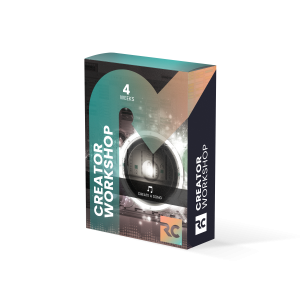Beatmaking Essentials – Melodies
$29.00
This course teaches students how to write and produce melodies that complement pre-made basslines and drum loops. Lessons focus on melodic writing, sound selection, resampling, and mixing. Students will explore techniques using Pro Tools, Ableton, and Logic Pro.
Lesson 1: Melodic Writing Fundamentals
Goal: Learn how to write melodies that are in key, harmonically complement the bassline, and enhance the overall track. Learning Expectations:
- Understand scales, modes, and how they influence melody creation.
- Use counterpoint to balance the melody with the bassline.
- Experiment with different rhythms and note lengths to create an engaging melody.
DAW-Specific Topics:
- Pro Tools: Use the MIDI Editor and Pencil Tool to create melodies in key.
- Ableton: Utilize the Scale MIDI Effect to stay in key and test melodic ideas.
- Logic Pro: Use the Scale Quantize feature and Smart Controls to shape melodies.
Lesson 2: MIDI vs. Sampling for Melodies
Goal: Explore the differences between using MIDI instruments and sampling to create melodies. Learning Expectations:
- Create original melodies using virtual instruments or synthesizers.
- Understand how to chop and repurpose melodic samples.
- Identify when to use MIDI or samples for specific production goals.
DAW-Specific Topics:
- Pro Tools: Use Structure Free for sampling and MIDI instrument layers.
- Ableton: Use Simpler to chop samples and draw MIDI patterns in Clip View.
- Logic Pro: Utilize Quick Sampler for sampling and the Arpeggiator for MIDI melodies.
Lesson 3: Sound Design and Sample Selection
Goal: Design or select sounds that enhance your melody and complement the bass and drum loop. Learning Expectations:
- Choose sounds that fit the mood and genre of the track.
- Modify presets and use synthesis to create unique melodic textures.
- Layer melodic sounds for richness and depth.
DAW-Specific Topics:
- Pro Tools: Use AIR Hybrid for sound design and layering.
- Ableton: Explore Analog and Wavetable for custom melodic tones.
- Logic Pro: Use Alchemy and ES2 for advanced sound design.
Lesson 4: Adding Chords and Pads to Support the Melody
Goal: Learn how to build and layer chords and pads to harmonically support the melody and create a fuller arrangement. Learning Expectations:
- Create chord progressions that complement the bassline and melody.
- Layer pads to add texture, warmth, and atmosphere to the track.
- Use voicing techniques to avoid clashing with the melody or bassline.
DAW-Specific Topics:
- Pro Tools: Use AIR Mini Grand or AIR Velvet for chords and pads.
- Ableton: Use Chord MIDI Effect to create progressions and layer pads with Tension.
- Logic Pro: Use Smart Chords and Retro Synth for warm, evolving pads.
Lesson 5: Resampling and Processing Melodies
Goal: Learn how to resample and process melodies to create unique textures and fit them into the mix. Learning Expectations:
- Bounce melodies to audio for further manipulation.
- Use effects like reverb, delay, and distortion to add depth and character.
- Apply pitch-shifting or time-stretching for creative sound design.
DAW-Specific Topics:
- Pro Tools: Use Elastic Audio and AudioSuite for resampling and processing.
- Ableton: Resample audio using Freeze and Flatten or external recording.
- Logic Pro: Use Bounce in Place and Flex Time for creative processing.
Lesson 6: Adding Variation with Automation and Chopping
Goal: Introduce movement and variation into melodies through automation or chopping techniques. Learning Expectations:
- Use automation to change parameters like pitch, filters, and effects over time.
- Chop melodies into smaller segments to rearrange or create new patterns.
- Incorporate dynamic changes to keep melodies interesting throughout the track.
DAW-Specific Topics:
- Pro Tools: Automate plugin parameters and MIDI note velocities.
- Ableton: Use Automation Envelopes and Slice to New MIDI Track for chopping.
- Logic Pro: Automate Smart Controls and utilize Region Automation for dynamic changes.
Course Wrap-Up:
Goal: Export a completed track featuring a bassline, drum loop, melody, chords, and pads arranged cohesively. Learning Expectations:
- Finalize the mix with balanced harmonic elements.
- Export the track as a high-quality audio file suitable for sharing or further production.
DAW-Specific Topics:
- Pro Tools: Use Bounce to Disk with optimal settings for final export.
- Ableton: Use Export Audio/Video for high-quality output.
- Logic Pro: Use Bounce function to render the track.
Outcome: By the end of the course, students will have developed the skills to add melodies, chords, pads, and variations to pre-made basslines and drum loops, creating richer and more dynamic tracks. This course can be paired with other beatmaking essentials for a complete production workflow.



Reviews
There are no reviews yet.